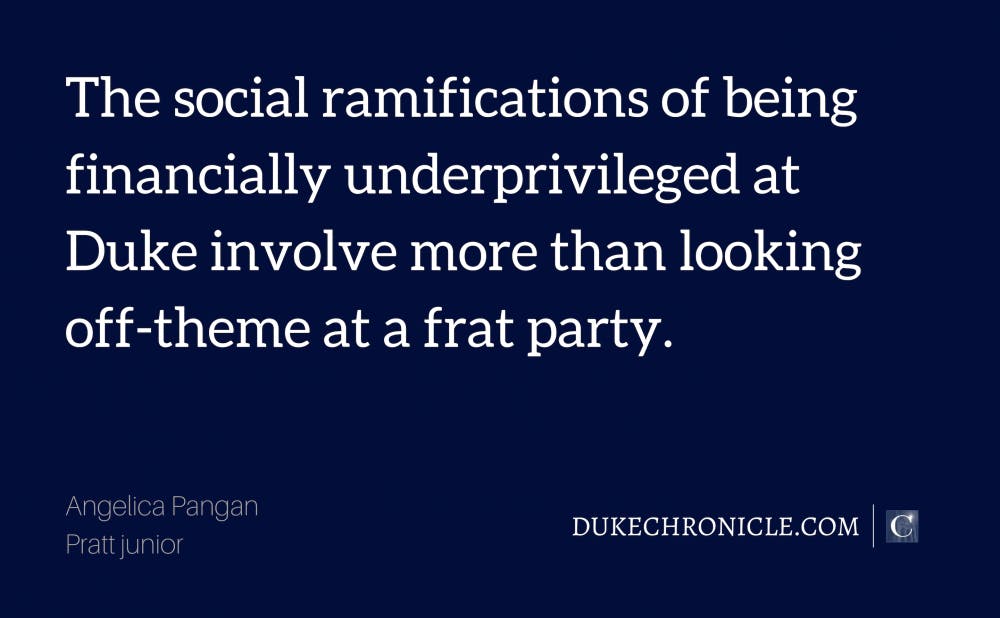When I first saw the title of Ali Thursland’s column on financial privilege at Duke, I was excited that someone had taken the time to address a struggle most Duke students aren’t aware of unless they’re experiencing it themselves. But after reading the column, I found myself deeply disappointed by it.
This article has belittled the experience of being financially underprivileged at Duke to being unable to do “cool kid things” with the Duke elite. Her focus on aspects of nightlife and party culture at Duke such as the expense of one-time-use outfits, Juul pods, alcohol, and cover charges at clubs completely misses the daily struggle and social implications that students’ financial situations have placed on every aspect of life.
Equitable access to Greek life and other selective living groups on campus is a significant social issue. I won’t deny that. The networking and career opportunities that students access through their affiliations with exclusive social groups like Greek life and SLGs place less wealthy students like me at a disadvantage.
But my daily life at Duke isn’t solely defined by my non-involvement in an SLG or sorority. I and many of your peers face social issues more fundamental than the ability to afford alcohol.
Of Duke’s undergraduate student body, 69 percent of them come from families in the top 20 percent. On the other end of the spectrum, only 12 percent of them received Pell Grants (a federal subsidy provided to students with financial need) in 2015. Students from this demographic don’t have the ability to impulsively spend $60 every weekend on entertainment, and their financial struggles don’t disappear when they abstain from Duke’s party culture.
The social ramifications of being financially underprivileged at Duke involve more than looking off-theme at a frat party. It looks like students staying on campus for Thanksgiving or Spring Break because they can’t afford to go home. It looks like turning down an invitation to eat out with friends because it’s not feasible to pay for meals without financial-aid-sponsored Food Points. It’s a student saying she’s too busy to hang out because she’s tired of telling people she can’t afford to go. It’s repeatedly explaining that earning money is not the same thing as having discretionary income when someone says, “You have a job, don’t you?”
Economic disparity looks like students opting out of traveling with their summer program peers because they can’t make the same decision to choose a $200 flight over a 12-hour, $15 bus ride. It’s repeatedly having to tell your peers that you’re saving up when they ask you, “Why don’t you just buy it?” It’s students who have to work 15+ hours a week to pay for essential needs like school supplies, cell phone bills, toiletries, and other supplies that many Duke students take for granted. It’s students who send the majority of their personal income home to their families. It’s hard-working students who stay sick longer because they can’t afford the copayments for medications or doctor’s appointments.
Our financial struggles are not confined to our weekend activities; suggesting so diminishes real issues of economic disparity by trivializing the struggles of less wealthy students.
Don’t reduce my life to a frat party. I’m sorry about the financial burden your Juul pods and your booze puts on you. But please don’t pretend that your party culture is an accurate depiction of the economic and financial disparity on Duke’s campus.
On behalf of your less privileged peers,
Angelica Pangan, P’ 20
Get The Chronicle straight to your inbox
Signup for our weekly newsletter. Cancel at any time.

